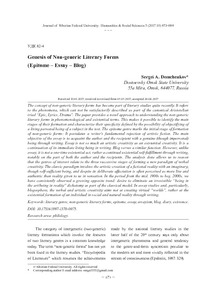Показать сокращенную информацию
Genesis of Non-generic Literary Forms (Epitome – Essay – Blog)
| Автор | Demchenkov, Sergei A. | en |
| Автор | Демченков, С.А. | ru_RU |
| Дата внесения | 2017-05-30T03:28:49Z | |
| Дата, когда ресурс стал доступен | 2017-05-30T03:28:49Z | |
| Дата публикации | 2017-05 | |
| URI (для ссылок/цитирований) | https://elib.sfu-kras.ru/handle/2311/32511 | |
| Аннотация | The concept of non-generic literary forms has become part of literary studies quite recently. It refers to the phenomena, which can not be satisfactorily described as part of the canonical Aristotelian triad “Epic, Lyrics, Drama”. The paper provides a novel approach to understanding the non-generic literary forms in phenomenological and existential terms. This makes it possible to identify the main stages of their formation and characterize their specificity defined by the possibility of objectifying of a living personal being of a subject in the text. The epitome genre marks the initial stage of formation of non-generic forms: It postulates a writer’s fundamental rejection of artistic fiction. The main objective of the essay is to acquaint the author and the recipient with a genuine (though impersonal) being through writing. Essay is not so much an artistic creativity as an existential creativity. It is a continuation of its immediate living being in writing. Blog serves a similar function. However, unlike essay, it is not a one-time existential act, rather a continual existential self-fulfillment through writing, notably on the part of both the author and the recipients. The analysis done allows us to reason that the genres of interest relate to the three successive stages of forming a new paradigm of verbal creativity. The classic paradigm involves the artistic creation of a fictional reality with an imaginary, though self-sufficient being, and despite its deliberate affectation is often perceived as more live and authentic than reality given to us in sensation. In the period from the mid. 1900s to beg. 2000s, we have consistently observed a growing opposite trend: desire to eliminate an irresistible “being in the art/being in reality” dichotomy as part of the classical model. In essay studies and, particularly, blogosphere, the verbal and artistic creativity aims not at creating virtual “worlds”, rather at the existential formation of an individual in social and natural reality through writing | en |
| Аннотация | Статья посвящена проблеме становления внеродовых форм в литературе. В работе показа- но, что их несоотносимость со сложившейся системой литературных родов обусловлена их особой онтологической природой. Очерк, эссе и блог отмечают три последовательных этапа формирования новой парадигмы словесного творчества, которая стремится к преодолению антиномий «искусство и действительность», «экзистенциальное и социальное», задающих точки отсчёта в системе координат традиционной словесности. Новизна использованного в статье методологического подхода заключается в том, что специфика внеродовых форм рассматривается в аспекте не только их эстетических характеристик, он и их экзистенци- альной функции | ru_RU |
| Язык | en | en |
| Издатель | Сибирский федеральный университет. Siberian Federal University | en |
| Тема | literary genre | en |
| Тема | non-generic literary forms | en |
| Тема | epitome | en |
| Тема | essay | en |
| Тема | essayism | en |
| Тема | blog | en |
| Тема | diary | en |
| Тема | existence | en |
| Тема | литературный род | ru_RU |
| Тема | внеродовые литературные формы | ru_RU |
| Тема | очерк | ru_RU |
| Тема | эссе | ru_RU |
| Тема | эссеизм | ru_RU |
| Тема | блог | ru_RU |
| Тема | дневник | ru_RU |
| Тема | экзистенция | ru_RU |
| Название | Genesis of Non-generic Literary Forms (Epitome – Essay – Blog) | en |
| Альтернативное название | Генезис внеродовых форм в литературе (очерк – эссе – блог) | ru_RU |
| Тип | Journal Article | |
| Тип | Published Journal Article | |
| Контакты автора | Demchenkov, Sergei A.: Dostoevsky Omsk State University 55a Mira, Omsk, 644077, Russia; omgu5555@gmail.com | en |
| Контакты автора | Демченков, С.А.: Омский государственный университет им. Ф.М. Достоевского Россия, 644077, Омск, пр. Мира, 55а | ru_RU |
| Страницы | 673-684 | ru_RU |
| Журнал | Журнал Сибирского федерального университета. Гуманитарные науки. Journal of Siberian Federal University. Humanities & Social Sciences;2017 10 (5) | en |

